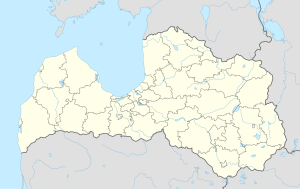Dobele
This article needs additional citations for verification. (August 2007) |
Dobele | |
|---|---|
Town | |
 Dobele castle ruins. | |
| Coordinates: 56°37′N 23°16′E / 56.617°N 23.267°E | |
| Country | |
| Municipality | Dobele Municipality |
| Town rights | 1917 |
| Area | |
• Total | 8.03 km2 (3.10 sq mi) |
| • Land | 7.91 km2 (3.05 sq mi) |
| • Water | 0.12 km2 (0.05 sq mi) |
| Population (2024)[2] | |
• Total | 8,589 |
| • Density | 1,100/km2 (2,800/sq mi) |
| Time zone | UTC+2 (EET) |
| • Summer (DST) | UTC+3 (EEST) |
| Postal code | LV-370(1-2) |
| Calling code | +371 637 |

Dobele (ⓘ; Template:Lang-de) is a town in the cultural region Zemgale in Latvia, and is located near the center of Latvia on the banks of the river Bērze. It received town rights in 1917 whilst being a part of the German occupied Courland Governorate during the First World War.[3] As of 2020, the population was 8,856.[4]
Name origin
In a German document from 1254 a place name Dubelene or Dubelone has been used. Later the names Doblene, Doblenen and Doblen also have been used for this inhabited location. The original place name can be reconstructed as Dobelene or Dobeliene, but its origins are linked to the place name duobe (pit or delve) and duobele (dip, dimple). Most likely, the reconstructed place name Dobelene meant 'populated area in a dimple'.[5]
History
Dobele is first mentioned in historical sources in 1254; however, at that time it was only a wooden fortress which was destroyed during the Semigallian War of Independence (1279–1290), the final phase of the Northern Crusades in Latvia. On its spot, a new stone castle was erected in 1335 and a small settlement grew up around it. The ruins of this fortress are still visible and are in the process of being restored. The original church was constructed in 1495, and eventually, the fortress developed into a trading post. In the 17th century, a watermill, sawmill, a cardigan mill, and a vinegar-works were constructed during the reign of duke Jacob Kettler. In 1927, the Jelgava–Liepāja Railway connected the city to other important towns and a period of development resulted.
Industry
Dobele is the home of many large enterprises, such as mills, the "Spodrība" chemical plant, and the "Baltic Candles" candle factory.[6]
Education
In Dobele, as in other Latvian towns, there are several educational establishments: five comprehensive schools, including the Dobele State Grammar School, four kindergartens, Music and Art schools, a Vocational school and Adult Education Center, as well as Children and Youth Centres.
Culture
The town of Dobele has a Cultural Centre as well as a museum. The town is also the location of 8 nationally protected monuments, such as the old castle, church, and town hall.
There are several annual festivals and holidays celebrated including the Ielīgosim Jāņus, the Midsummer celebration, and the jubileja, or festival, which changes yearly.
Demographics
Latvians make up 75.5% of the population while Russians, at 14%, are a significant minority. Other groups include Belarusians - 3.3%, Lithuanians - 2.3%, Ukrainians -1.8%, Poles - 1.5%, and 1.6% are of other nationalities.
-
Dobele Lutheran church (1495)
-
Catholic church (2003)
-
Dobele Railway Station
-
The main square
-
19th-century buildings in the city center
Notable people
- Alexei Kudrin, Minister of Finances of Russia
- Andris Naudužs, racing cyclist
- Lauris Reiniks, musician
- Gunārs Saliņš, modernist poet
- Viktors Ščerbatihs, weightlifter, Olympic silver-medalist
- Ritvars Suharevs, weightlifter
- Kristers Tobers, Football player, Latvia National football team, Lechia Gdansk
See also
References
- ^ "Reģionu, novadu, pilsētu un pagastu kopējā un sauszemes platība gada sākumā". Central Statistical Bureau of Latvia. Retrieved 31 July 2024.
- ^ "Iedzīvotāju skaits pēc tautības reģionos, pilsētās, novados, pagastos, apkaimēs un blīvi apdzīvotās teritorijās gada sākumā (pēc administratīvi teritoriālās reformas 2021. gadā)". Central Statistical Bureau of Latvia. Retrieved 19 June 2024.
- ^ "Pilsēta". Dobeles pilsētas dome. Retrieved 2008-03-05.
- ^ "ISG020. Population number and its change by statistical region, city, town, 21 development centres and county". Central Statistical Bureau of Latvia. 2020-01-01. Retrieved 2021-02-12.
- ^ Laimute Balode, Ojārs Bušs. No Abavas līdz Zilupei. Vietvārdu cilmes īsā vārdnīca. Rīga : Latviešu valodas aģentūra, 2015, 94.—95. lpp.
- ^ Uzņēmumi








